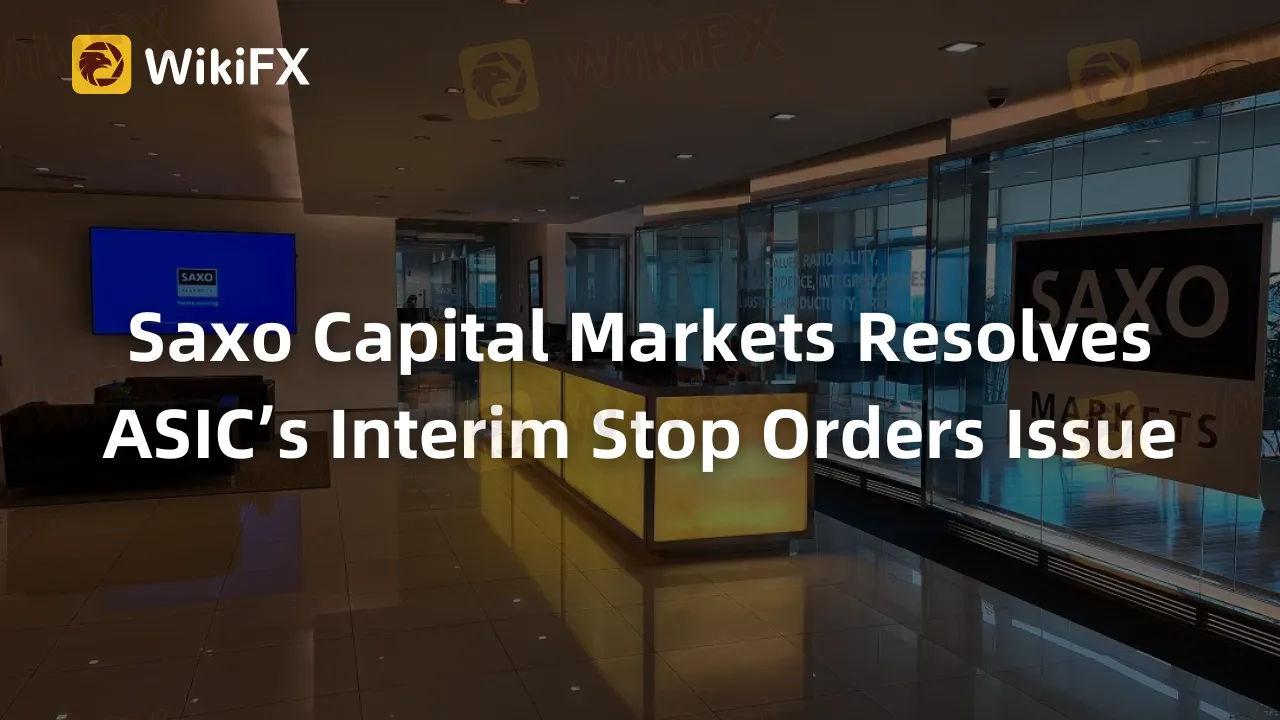简体中文
繁體中文
English
Pусский
日本語
ภาษาไทย
Tiếng Việt
Bahasa Indonesia
Español
हिन्दी
Filippiiniläinen
Français
Deutsch
Português
Türkçe
한국어
العربية
Saxo Capital Markets Resolves ASIC’s Interim Stop Orders Issue
Abstract:Saxo Capital Markets (Australia) resolved eight interim stop orders from the Australian Securities and Investments Commission (ASIC) concerning new contracts for difference (CFDs) for retail clients. The orders were lifted after Saxo amended its target market determinations (TMDs), addressing ASIC's concerns over potential retail client losses.

Saxo Capital Markets (Australia) Limited, after having faced eight interim stop orders from the Australian Securities and Investments Commission (ASIC), managed to turn things around on May 18, 2023. The orders, initially issued on May 16, 2023, were instated due to concerns over inadequacies in Saxos target market determinations (TMDs) for new contracts for difference (CFDs) to be issued to retail clients. After Saxo amended its TMDs, addressing the ASIC's apprehensions, the orders were revoked.
Saxo Restricted from Offering Eight Derivatives
The temporary stop orders had barred Saxo from issuing eight types of derivatives to retail clients and setting up new trading accounts for these clients. The derivatives included Single Stock CFDs, FX CFDs, ETFs CFDs, Index CFDs, Commodity Futures CFDs, Bond CFDs, Index Option CFDs, and Cryptocurrency Derivatives. The orders remained active for 21 days or until an earlier revocation.

ASIC‘s Concerns with Saxo's TMDs
ASIC expressed concern that Saxo’s TMDs inappropriately included retail clients intending to use CFDs as a major part of their investment portfolio, and clients with an investment timeframe of up to one or three years, considering the potential significant aggregate overnight financing fees. ASIC's concern also extended to clients seeking growth and income via Single Stock CFDs, ETF CFDs, and Index CFDs, as the high proportion of CFD retail clients often loses money trading CFDs.
ASICs Effort to Protect Retail Clients
ASIC states that the interim orders were established to shield retail clients from obtaining CFDs from Saxo, which may not align with their financial objectives, situation, or needs. However, the orders did not hinder existing Saxo clients from altering or closing their CFD positions.
ASIC's Emphasis on Design and Distribution Obligations
The ASIC highlighted the importance of issuers adequately defining target markets for their products under the design and distribution obligations (DDO). Issuers are required to account for the risks and features of their products and strategize product distribution to ensure alignment with the target market.
Track Record of ASIC‘s Interim Stop Orders
Up to now, ASIC has issued 36 interim stop orders under DDO, Saxo CFDs being part of these. From the 36 orders, 31 have been revoked following amendments or withdrawals of the products in response to ASIC’s concerns, while five are still effective.
ASICs Call for Improvement
Earlier in May, ASIC urged investment product issuers to 'up their game', following an initial review that revealed significant opportunities for enhancing compliance with design and distribution obligations.
Download and install the WikiFX App on your smartphone to stay updated on the latest news.
Download the App here: https://social1.onelink.me/QgET/px2b7i8n

Disclaimer:
The views in this article only represent the author's personal views, and do not constitute investment advice on this platform. This platform does not guarantee the accuracy, completeness and timeliness of the information in the article, and will not be liable for any loss caused by the use of or reliance on the information in the article.
Read more

Bank Negara Malaysia Flags 12 New Companies for Unauthorised Activity
Bank Negara Malaysia (BNM) has updated its Financial Consumer Alert List (FCA List) by adding 12 more entities, reinforcing its efforts to warn the public against unregulated financial schemes. Check if your broker made the list!

TradingView Brings Live Market Charts to Telegram Users with New Mini App
TradingView has launched a mini app on Telegram, making it easier for users to track market trends, check price movements, and share charts.

March Oil Production Declines: How Is the Market Reacting?
Oil production cuts in March are reshaping the market. Traders are closely watching OPEC+ decisions and supply disruptions, which could impact prices and future production strategies.

How to Calculate Leverage and Margin in the Forex Market
Leverage amplifies both potential profits and risks. Understanding how to calculate leverage and margin helps traders manage risks and avoid forced liquidation.
WikiFX Broker
Latest News
The Withdrawal Trap: How Scam Brokers Lure Victims into Paying More
FCA to Investors: Think Twice Before Trusting These Brokers
Trump\s tariffs: How could they affect the UK and your money
Trump gambles it all on global tariffs he\s wanted for decades
TradingView Brings Live Market Charts to Telegram Users with New Mini App
Trump tariffs: How will India navigate a world on the brink of a trade war?
IG Group Acquires Freetrade for £160M to Expand UK Investment Market
U.S. March ISM Manufacturing PMI Released
Should You Beware of Forex Trading Gurus?
Vanuatu Passes VASP Act to Regulate Crypto and Digital Assets
Currency Calculator







